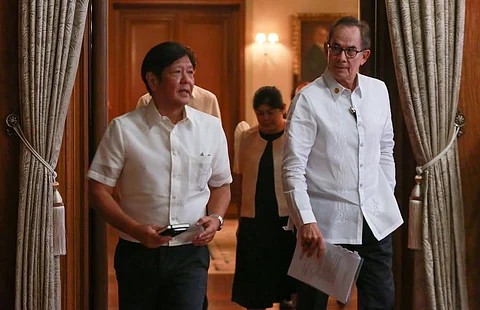
- NEWS
- the EDIT
- COMMENTARY
- BUSINESS
- LIFE
- SHOW
- ACTION
- GLOBAL GOALS
- SNAPS
- DYARYO TIRADA
- MORE

When Sabin Aboitiz took the helm of Aboitiz Equity Ventures in 2020, he was handed the weight of a family empire with roots tracing back to the abaca trading days of the late 1800s on Leyte.
Today, as president and CEO, Sabin is steering the Aboitiz Group through what he boldly calls the “Great Transformation: a strategic overhaul to become the Philippines’ first techglomerate.”
Asked for the best leadership advice he’s ever received, his answer was simple:
“Don’t try to be someone else. Just be who you are.”
It’s a fitting philosophy for a leader trying to turn a 100-year-old family business into a high-speed, tech-powered force for the future.
He aims to reshape a legacy conglomerate into what he describes as a “25-year-old athlete” — agile, fast and future-ready.
“We have to be legacy, yet we have to be very agile. That’s actually where we are today doing that,” said Aboitiz in an exclusive interview with Christine Tan on CNBC’s Managing Asia.
From power to banking, infrastructure to consumer retail, Aboitiz is retooling each arm of the business with digital transformation at the center. But as he openly admits, the journey hasn’t been easy.
“Ten years ago, we started what we called at that time the digital transformation and we failed miserably. I guess we’re a bit ahead of our time, or we didn’t understand what was needed to succeed. So we’ve learned that there was one reason why we failed, and that’s because the minds were not open,” Aboitiz recalled.
The pandemic shook things up and accelerated change. The business environment forced open minds and exposed gaps, prompting faster adoption of innovation across the organization.
“The pandemic, the surroundings, have changed people,” he said. “2025 is our check to see whether our minds are really open or not. Or if things are actually starting to happen independently without us pushing for it.”
Despite lacking a consolidated financial figure for the group-wide transformation, Sabin is pragmatic about the costs.
“You throw away as little as possible because you will have to throw away some money… The payback can be financial or in other ways.”
He treats this as a necessity.
“It is an investment that you have no choice but to make. If not, you for sure, will be behind.”
The Aboitiz Group’s electricity generation business has long been a pillar of its profitability. But the pandemic-era slump was a wake-up call that even its most substantial segments are vulnerable.
“Well, it shows that things are just not under your control,” Aboitiz recalled. “We always talk about diversifying, and it accelerated it.”
That shift in mindset paved the way for strategic moves, including a partnership with Japanese energy giant JERA, and one of the most significant acquisitions in Philippine consumer business history: the $1.8 billion purchase of Coca-Cola Beverages Philippines in 2024.
“We believe that the growing middle class of the country and the high growth rates are benefiting consumer [business].”
Aboitiz is also bullish on infrastructure projects with a consumer edge, especially airports — a pivot driven by the country’s tourism potential.
“We want to be there because tourism is something that we can — the country can — definitely compete against anybody in the world.”
After acquiring Mactan-Cebu International Airport, the group won concessions to operate Laguindingan and Bohol airports.
“The airport business is directly proportional to the number of tourists that come in.”
With fixed costs and variable returns tied to passenger volume, Aboitiz sees airports as gateways to economic growth and as consumer hubs with real estate potential — from hotels to mixed-use developments.
Despite its expansion, Aboitiz is not interested in complexity for its own sake. He aims to simplify the group’s structure and focus on areas with clear synergies, scalability and growth.
“We’re doing a simplification… Let’s make sure that we can focus on what’s important, what’s gonna give us the growth, what’s going to give us the cash flow… and where we can find the talent.”
That discipline also extends to the company’s foray into consumer banking. In 2022, Aboitiz acquired Citibank’s Philippine operations, further embedding the group in Filipinos’ financial lives.
Sabin also plays a crucial national role as lead convenor of the Private Sector Advisory Council (PSAC), which advises President Ferdinand Marcos Jr. on how private enterprise can support public policy goals.
“This president believes in the private sector,” he said. “We have 30 CEOs of the biggest companies in the Philippines divided into six different areas… we are allowed to present what we think is important.”
When asked why he would take on such a role, he answered, “If you have this opportunity to help your country, why wouldn’t you do it?”
“On a personal basis, what I learned from being exposed to the government, to all these industries, to all these CEOs is learning that I think very, very few will have the privilege of… It’s been fantastic for me.”
As the fourth-generation leader of a Filipino business dynasty, Sabin Aboitiz brings both the weight of legacy and the hunger for reinvention. He’s spent his entire professional life within the group, working across its various businesses before rising to CEO.
